The Thirst Read online
Page 8
‘You should stop smoking,’ fru Syvertsen said, studying him. ‘That’s all I’ve got to say. Which gym do you go to?’
‘The cellar,’ Harry said.
‘Have you installed a gym? Who’s your trainer?’
‘I am,’ Harry said, taking a deep drag and looking at his reflection in the window in the back door of the car. Thin, but not as skinny as a few years ago. Three kilos more muscle. Two kilos of stress-free days. And a healthier lifestyle. But the face looking back at him bore witness to the fact that this hadn’t always been the case. The deltas of thin red veins in the whites of his eyes and just under the skin of his face betrayed a past characterised by alcohol, chaos, lack of sleep and other bad habits. The scar running from one ear to the corner of his mouth spoke of desperate situations and a lack of control. And the fact that he was holding his cigarette between his index and ring fingers, and that he no longer had a middle finger, was yet further evidence of murder and mayhem written in flesh and blood.
He looked down at the newspaper. Saw the word ‘murder’ across the fold. And for a moment the echo of the scream was back again.
‘I’ve been thinking of installing a gym of my own,’ fru Syvertsen said. ‘Why don’t you pop round one morning next week and give me some advice?’
‘A mat, some weights, and a beam to hang from,’ Harry said. ‘That’s my advice.’
Fru Syvertsen gave him a wide smile. Nodded as if she understood. ‘Have a good day, Harry.’
The Tesla whistled off on its way, and he walked back towards the place he called home.
When he reached the shade of the big fir trees he stopped and looked at the house. It was solid. Not impregnable, nothing was impregnable, but it would take some effort. There were three locks in the heavy oak door, and there were iron bars over the windows. Herr Syvertsen had complained, said the fortified house looked like something out of Johannesburg, and that it made their safe area look dangerous and would depress property values. Rakel’s father had had the bars installed after the war. Harry’s work as a murder detective had once put Rakel and her son Oleg in danger. Oleg had grown up since then. He had moved out and was now living with his girlfriend, and had enrolled at Police College. It was up to Rakel to decide when the bars were removed. Because they were no longer needed. Harry was just an underpaid teacher now.
‘Oh, break-fuss,’ Rakel mumbled with a smile, did an exaggerated yawn and sat up in bed.
Harry put the tray down in front of her.
Break-fuss was their word for the hour they spent in bed every Friday morning when he started late and she had the whole day off from her job as a lawyer in the Foreign Ministry. He crept in under the covers and, as usual, gave her the section of Aftenposten containing the domestic news and sport, while he kept the international news section and culture. He put on the glasses he had belatedly accepted that he needed, and immersed himself in a review of Sufjan Stevens’s latest album while he thought about Oleg’s invitation to go with him to a Sleater-Kinney concert next week. Enervating, slightly neurotic rock, just the way Harry liked it. Oleg really preferred harder stuff, which only made Harry appreciate the gesture all the more.
‘Anything new?’ Harry asked as he turned the page.
He knew she was reading about the murder he had seen on the front page, but also that she wasn’t going to mention it to him. One of their silent agreements.
‘Over thirty per cent of American Tinder users are married,’ she said. ‘But Tinder are denying it. How about you?’
‘Sounds like the new Father John Misty album’s a bit crap. Either that or the reviewer’s just got old and grumpy. I’d guess the latter. It’s had good reviews in Mojo and Uncut.’
‘Harry?’
‘I prefer young and grumpy. Then slowly but surely getting more amenable over the years. Like me. Don’t you think?’
‘Would you be jealous if I was on Tinder?’
‘No.’
‘No?’ He noticed her sitting up in bed. ‘Why not?’
‘I suppose I’m just unimaginative. I’m stupid, and believe I’m more than enough for you. Being stupid isn’t all that stupid, you know.’
She sighed. ‘Don’t you ever get jealous?’
Harry turned another page. ‘I do get jealous, but Ståle Aune has recently given me a number of reasons to try to minimise it, darling. He’s actually giving a guest lecture about morbid jealousy to my students today.’
‘Harry?’ He could tell from the tone of her voice that she wasn’t going to give up.
‘Don’t start with my name, please, you know it makes me nervous.’
‘You’ve got good reason to be, because I’m thinking about asking if you ever fancy anyone apart from me.’
‘You’re thinking about it? Or you’re asking now?’
‘I’m asking now.’
‘OK.’ His eyes settled on a picture of Police Chief Mikael Bellman and his wife at a film premiere. Bellman suited the black eyepatch he had started to wear, and Harry knew that Bellman knew it. The young Police Chief had declared that the media and crime films such as the one in question created a false picture of Oslo, and that during his time as Chief of Police the city was safer than ever. The statistical risk of someone killing themselves was far greater than them being killed by someone else.
‘Well?’ Rakel said, and he felt her move closer. ‘Do you fancy other women?’
‘Yes,’ Harry said, stifling a yawn.
‘All the time?’ she asked.
He looked up from the paper. Stared in front of him with a frown. He considered the question. ‘No, not all the time.’ He resumed reading. The new Munch Museum and Public Library were starting to take shape next to the Opera House. In a country of fishermen and farmers, which had spent the past two hundred years sending any dodgy deviants with artistic ambitions to Copenhagen and Europe, the capital city would soon resemble a city of culture. Who would have believed it? Or, more pertinently: who did believe it?
‘If you could choose,’ Rakel teased playfully, ‘if it didn’t have any consequences at all, would you rather spend tonight with me or your dream woman?’
‘Haven’t you got a doctor’s appointment?’
‘Just one night. No consequences.’
‘Are you trying to get me to say that you’re my dream woman?’
‘Come on.’
‘You’ll have to help me with suggestions.’
‘Audrey Hepburn.’
‘Necrophilia?’
‘Don’t try to wriggle out of it, Harry.’
‘OK. I suspect you of suggesting a dead woman because you assume I’ll think you’d find it less of a threat if it’s a woman I can’t spend the night with, in purely practical terms. But fine, thanks to your manipulative help and Breakfast at Tiffany’s, my answer is a loud and clear yes.’
Rakel let out a half-stifled yelp. ‘In that case, why don’t you just do it? Why not have a fling?’
‘To start with, I don’t even know if my dream woman would say yes, and I’m no good at dealing with rejection. And secondly, because the bit about “no consequences” doesn’t apply.’
‘Really?’
Harry focused on the newspaper again. ‘You might leave me. Even if you don’t, you won’t look at me the same way any more.’
‘You could keep it secret.’
‘I wouldn’t have the energy.’ The former Councillor for Social Affairs, Isabelle Skøyen, had criticised the current City Council for not having a contingency plan in advance of the so-called tropical storm that was forecast to hit the west coast early next week, with a force the country had never before experienced. Even more unusual was the fact that the storm was predicted to hit Oslo at only a marginally diminished strength a few hours later. Skøyen claimed that the Council Leader’s response (‘We don’t live in the tropics, so we don’t set money aside for tropical storms’) betrayed an arrogance and irresponsibility bordering on lunacy. ‘Evidently he believes that climate change is somethi
ng that only affects other countries,’ Skøyen had said, beside a photograph of her in a characteristic pose which told Harry she was planning to make a political comeback.
‘When you say you wouldn’t have the energy to keep an affair secret, do you mean “couldn’t keep up the pretence”?’ Rakel asked.
‘I mean “couldn’t be bothered”. Keeping secrets is exhausting. And I’d feel guilty.’ He turned the page. No more pages. ‘Having a guilty conscience is exhausting.’
‘Exhausting for you, sure. What about me, haven’t you thought about how hard it would be for me?’
Harry glanced at the crossword before putting the newspaper down on the duvet and turning towards her. ‘If you don’t know about the affair, then surely you won’t feel anything at all, darling?’
Rakel took hold of his chin and held it while her other hand fiddled with his eyebrows. ‘But what if I found out? Or you found out that I’d slept with another man. Wouldn’t that upset you?’
He felt a sudden flash of pain as she plucked a straggly grey hair from one eyebrow.
‘Of course,’ he said. ‘Hence the guilty conscience if it was the other way round.’
She let go of his chin. ‘Darn it, Harry, you talk as if you were trying to figure out a murder case. Don’t you feel anything?’
‘Darn it?’ Harry gave a crooked smile and peered at her over his glasses. ‘Do people still say “darn it”?’
‘Just answer, dar— oh, tarnation!’
Harry laughed. ‘I feel that I’m trying to answer your questions as honestly as I can. But in order to do that, I need to think about them, and be realistic. If I were to follow my initial emotional instinct, I’d have said what I thought you wanted to hear. So here’s a warning. I’m not honest, I’m a slippery sod. My honesty now is merely a long-term investment in my own plausibility. Because there may come a day when I really need to lie, and then it might be handy if you think I’m honest.’
‘Wipe that grin off your face, Harry. So what you’re actually saying is that you’d be an adulterous bastard if it wasn’t so much bother?’
‘Looks like it.’
Rakel gave him a shove, swung her legs out of bed and shuffled out through the doorway in her slippers with a derisive snort.
Harry heard her snort again on the stairs.
‘Can you put the kettle on?’ he called.
‘Cary Grant,’ she called back. ‘And Kurt Cobain. At the same time.’
He heard her moving about downstairs. The rumbling sound of the kettle. Harry moved the newspaper to the bedside table and put his hands behind his head. Smiled. Happy. As he got up he caught sight of her part of the paper, still on her pillow. He saw a picture, a crime scene behind a police cordon, closed his eyes and went over to the window. He opened them again and looked out at the fir trees. He felt he could manage it now. Could manage to forget the name of the one who got away.
He woke up. He had been dreaming about his mother again. And a man who claimed to be his father. He wondered what sort of awakening this was. He was rested. He was calm. He was content. The main reason lay less than an arm’s length away from him. He turned towards her. He had gone into hunting mode yesterday. That hadn’t been the intention, but when he saw her – the policewoman – in the bar, it was as if fate had grabbed the wheel for a moment. Oslo was a small city, people were always bumping into each other, but all the same. He hadn’t run amok, though, he had learned the art of self-control. He studied the lines on her face, her hair, the arm lying at a slightly unnatural angle. She was cold, and she wasn’t breathing; the smell of lavender was almost gone, but that was OK, she had done her job.
He threw the covers back and went over to the wardrobe, and took the uniform out. He brushed it down. He could already feel the blood pumping faster through his body. It was going to be another good day.
7
FRIDAY MORNING
HARRY HOLE WAS walking down the corridor in Police College with Ståle Aune. At 192cm tall, Harry was some twenty centimetres taller than his friend, who was twenty years older than him and a good deal fatter.
‘I’m surprised that you can’t solve such an obvious case,’ Aune said, checking that his spotted bow tie was in the right place. ‘There’s no mystery, you became a teacher because your parents were. Or, to be more accurate, because your father was. Even post-mortem, you’re still trying to get his approval, which you never got as a police officer, and never actually wanted as a police officer, seeing as your rebellion against your father was about not being the same as him, whom you saw as a feeble individual because he hadn’t been able to save your mother’s life. You projected your own inadequacies onto him. And joined the police to make up for the fact that you weren’t able to save your mother either. You wanted to save us all from death, or, more precisely, from being murdered.’
‘Hm. How much do people pay per appointment to listen to stuff like that?’
Aune laughed. ‘Speaking of appointments, how did Rakel get on about her headaches?’
‘The appointment’s today,’ Harry said. ‘Her dad suffered from migraines, and they only started later in life.’
‘Heredity. It’s like going to a fortune-teller and regretting it. As human beings, we tend not to like things we can’t avoid. Death, for instance.’
‘Heredity isn’t unavoidable. My grandfather said he became an alcoholic the first time he ever had a drink, just like his father. Whereas my father enjoyed – as in actually enjoyed – alcohol all his life without becoming a alcoholic.’
‘So alcoholism skipped a generation. That sort of thing happens.’
‘Unless me blaming my genes is just an easy excuse for my own weak character.’
‘OK, but then you ought to be allowed to blame your weak character on your genes as well.’
Harry smiled and a female student walking in the other direction misread it and smiled back.
‘Katrine’s sent me some photographs of the crime scene in Grünerløkka,’ Aune said. ‘What do you think about it?’
‘I don’t read about crime.’
The door to lecture theatre 2 stood open ahead of them. The lecture formed part of the syllabus for the final-year students, but Oleg had said that he and a couple of others in the first year were going to try to sneak in. Sure enough, the auditorium was packed. There were students and even a few of the other lecturers sitting on the steps and standing by the walls.
Harry walked up to the podium and switched the microphone on. Looked out at the audience. Found himself searching automatically for Oleg’s face. Conversation died away and silence settled on the room. The most peculiar thing wasn’t that he’d become a teacher, but that he liked it. That he, like most people usually regarded as taciturn and introverted, felt less inhibited in front of a gathering of demanding students than when the guy at the only open checkout in the 7-Eleven put a packet of Camel Lights down on the counter and Harry thought about repeating his request for ‘Camels’, before noticing the restlessness of the queue behind him. Sometimes, on bad days when his nerves were twitchy, he would actually walk out with the Camel Lights, smoke one and throw the rest of the pack away. But here he was in his comfort zone. Work. Murder. Harry cleared his throat. He hadn’t found Oleg’s face, always so serious, but he had spotted another one he knew well. One with a black patch over one eye. ‘I see that some of you must be here by mistake – this is a level-three course in detective work for final-year students.’
Laughter. No one showed any inclination to leave the room.
‘OK,’ Harry said. ‘I’m afraid anyone who’s here for yet another of my bone-dry lectures on how to investigate murders is going to be disappointed. Our guest lecturer today has been an adviser to the Crime Squad Unit in Police Headquarters for many years, and is Scandinavia’s foremost psychologist in the field of violence and murder. But before I give the floor to Ståle Aune, and because I know he won’t give it back voluntarily, can I remind you that there’s going to be a fresh cross-
examination next Wednesday? ‘The devil’s star’ investigation. As usual, the case description, crime-scene reports and interview transcripts are all on the intranet. Ståle?’
Applause broke out and Harry walked towards the steps, as Aune swaggered up to the podium with his stomach out and a contented smile on his lips.
‘Othello syndrome!’ Aune declared, then lowered his voice when he reached the microphone. ‘Othello syndrome is another term for what we call morbid jealousy, and it’s the motive for most murders in this country. Just as jealousy is in William Shakespeare’s play Othello. Roderigo is in love with General Othello’s new bride, Desdemona, while the sly Iago hates Othello because he feels he was overlooked when the general didn’t appoint him as his new lieutenant. Iago sees a chance to advance his own career by destroying Othello, so with Roderigo he sows discord between Othello and his wife. And Iago does this by planting a virus in Othello’s brain and in his heart, a lethal and tenacious virus that comes in many guises. Jealousy. Othello gets sicker and sicker, his jealousy causes epileptic attacks, leaving him shaking on the stage. Othello ends up killing his wife, and finally he kills himself too.’ Aune tugged at the sleeves of his tweed jacket. ‘The reason why I am telling you the plot is not because Shakespeare is part of the curriculum here at Police College, but because you need a bit of general education.’ Laughter. ‘So what, my unjealous ladies and gentlemen, is Othello syndrome?’
‘To what do we owe this visit?’ Harry whispered. He had gone to stand at the back of the lecture theatre next to Mikael Bellman. ‘Interested in jealousy?’
‘No,’ Bellman said. ‘I want you to investigate this latest murder case.’
‘Then I’m afraid you’ve had a wasted journey.’
‘I want you to do what you’ve done in the past: lead a small team that works in parallel to and independently of the larger investigative team.’

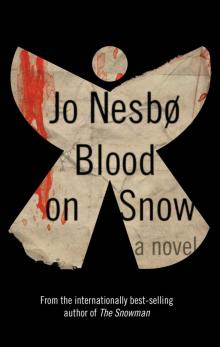 Blood on Snow: A novel
Blood on Snow: A novel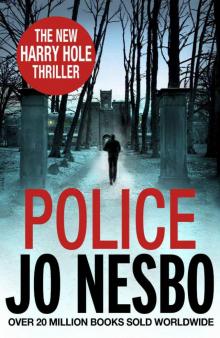 Police: A Harry Hole thriller (Oslo Sequence 8)
Police: A Harry Hole thriller (Oslo Sequence 8) Doctor Proctor's Fart Powder: The Great Gold Robbery
Doctor Proctor's Fart Powder: The Great Gold Robbery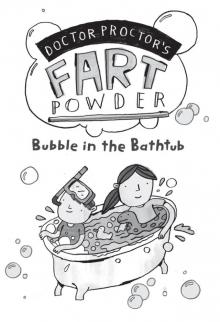 Bubble in the Bathtub
Bubble in the Bathtub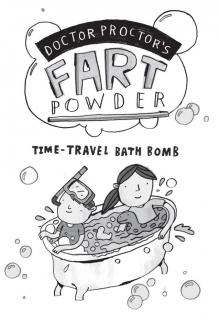 Doctor Proctor's Fart Powder: Time-Travel Bath Bomb
Doctor Proctor's Fart Powder: Time-Travel Bath Bomb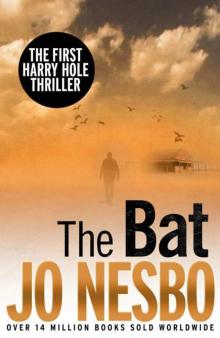 The Bat
The Bat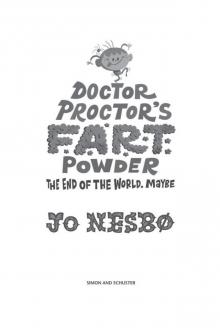 Doctor Proctor's Fart Powder: The End of the World. Maybe.
Doctor Proctor's Fart Powder: The End of the World. Maybe.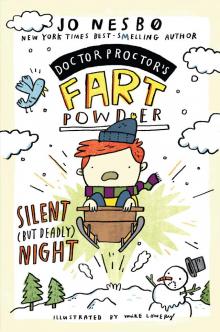 Silent (but Deadly) Night
Silent (but Deadly) Night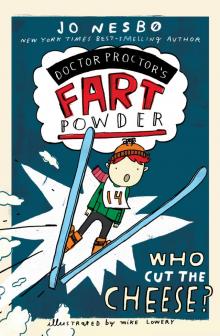 Who Cut the Cheese?
Who Cut the Cheese? Headhunters
Headhunters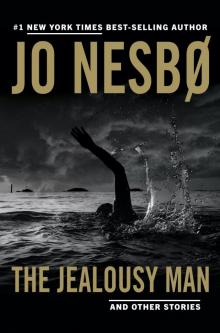 The Jealousy Man and Other Stories
The Jealousy Man and Other Stories Harry Hole Mysteries 3-Book Bundle
Harry Hole Mysteries 3-Book Bundle The Thirst
The Thirst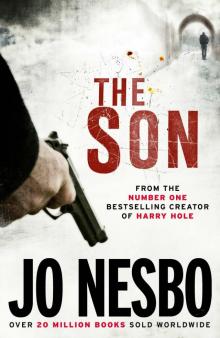 The Son
The Son The Redeemer
The Redeemer The Kingdom
The Kingdom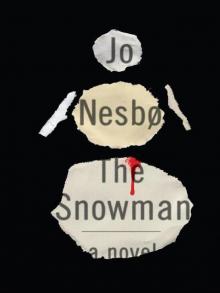 The Snowman
The Snowman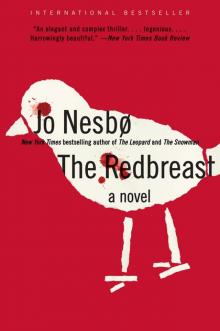 The Redbreast
The Redbreast Phantom
Phantom Macbeth
Macbeth The Leopard
The Leopard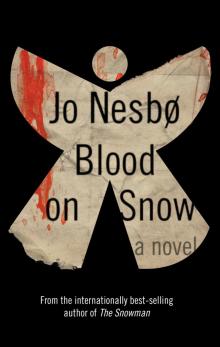 Blood on Snow
Blood on Snow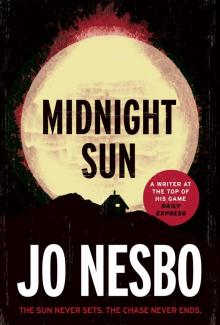 Midnight Sun
Midnight Sun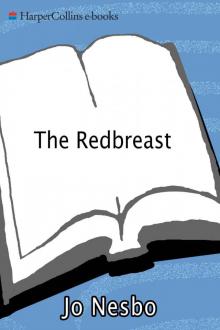 The Redbreast (Harry Hole)
The Redbreast (Harry Hole)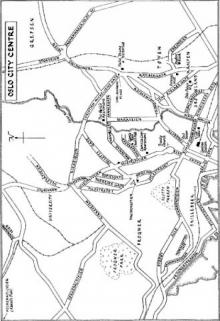 The Devil's Star
The Devil's Star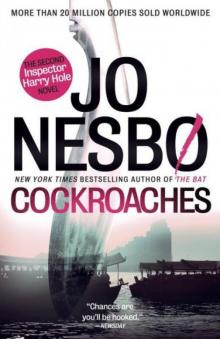 Cockroaches
Cockroaches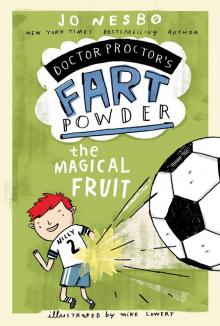 The Magical Fruit
The Magical Fruit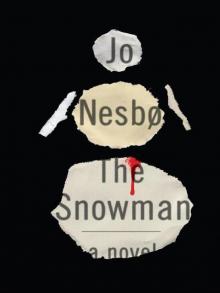 The Snowman: A Harry Hole Novel
The Snowman: A Harry Hole Novel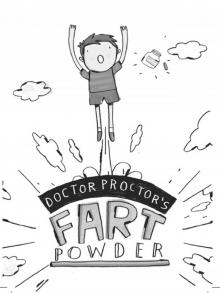 Doctor Proctor's Fart Powder
Doctor Proctor's Fart Powder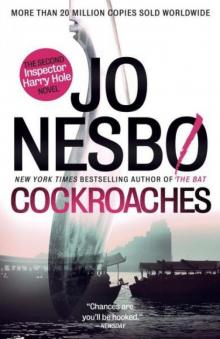 The Cockroaches
The Cockroaches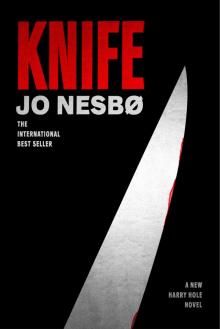 Knife
Knife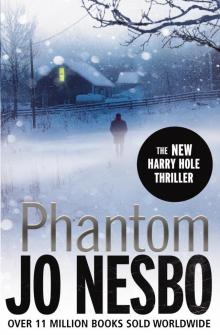 Phantom hh-9
Phantom hh-9 The Redbreast hh-3
The Redbreast hh-3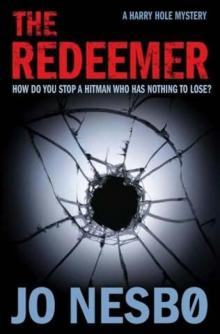 The Redeemer hh-6
The Redeemer hh-6 The Leopard hh-8
The Leopard hh-8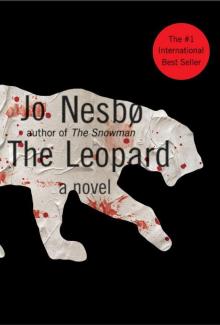 The Leopard: An Inspector Harry Hole Novel
The Leopard: An Inspector Harry Hole Novel The Great Gold Robbery
The Great Gold Robbery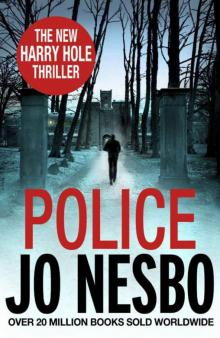 Police hh-10
Police hh-10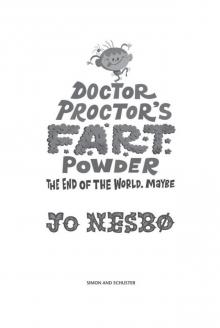 The End of the World. Maybe
The End of the World. Maybe The Thirst: Harry Hole 11
The Thirst: Harry Hole 11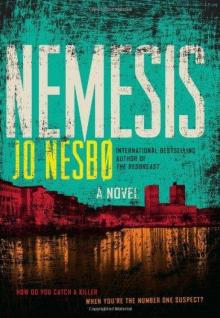 Nemesis - Harry Hole 02
Nemesis - Harry Hole 02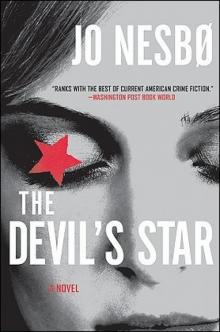 The Devil's star hh-5
The Devil's star hh-5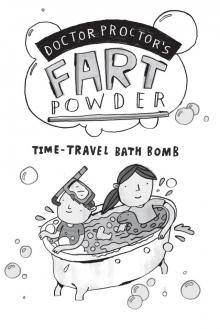 Time-Travel Bath Bomb
Time-Travel Bath Bomb